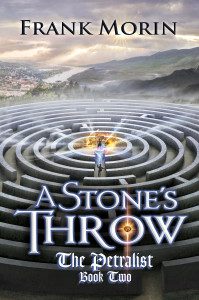 Let’s face it, most New Year’s resolutions fail. It’s fun to set goals, but it’s hard to establish patterns of success and to maintain enough focused enthusiasm to see those goals to completion.
Let’s face it, most New Year’s resolutions fail. It’s fun to set goals, but it’s hard to establish patterns of success and to maintain enough focused enthusiasm to see those goals to completion.
You may ask, “Does that mean setting goals is a waste of time?”
Not at all. I’m a big fan of setting goals, and I often use the famous SMART method. Make the goals Specific, Measurable, Action-oriented, Realistic, and Timely. I’ve accomplished much this way.
Sometimes the SMART method isn’t so smart, though. There are times when we need to leave SMART behind and aim for the stars.
That means to think big, think outside of the box, contemplate breaking free of the ruts we’ve fallen into and set a goal that’s so far out there, it takes your breath away and makes you nervous.
And motivates you like nothing else can.
Those are the goals that inspire, that generate enough enthusiasm to launch beyond inertia and make something happen. If a goal like that fails, it’ll fail in a big way, but might still change the landscape of your life.
Like the saying goes, “Aim for the stars, and you might land on the moon!”
A corollary to that is: “Aim for the mud, and you’re bound to make it.”
Last year I aimed for the stars and decided to launch my writing career in a big way. I’d been writing for almost ten years, with several manuscripts completed, and I was considering jumping into indie publishing with both feet. I’d already self-published one novella, but had lacked the confidence to really launch it. I’d released it under cover of darkness on a moonless night, and of course, it went nowhere. Since then, it’s starting to gather steam, and it’s been well-liked by the few who have found it, but that was not the way to get books published. I needed a different approach.
So I said, “Hey, if I’m going to do this, let’s really do this.”
I set the ridiculously ambitious goal of publishing eight books in eight months. This was no secret goal. I went public with it. I told the world I was going to do it, I created the hashtag for it (#8books8months) and I set to work to make it happen.
I didn’t publish eight books last year.
Not even close.
However, I did publish three books last year. Three major titles, each about 150,000 words, in hardcover, paperback, and ebook formats. They’re awesome, and they launched pretty big. I got a short story published in an anthology filled with incredible authors, including several other fictorians.
I also created a publishing company and learned all the ins and outs and difficulties associated with indie-publishing novels, and I worked through them. I worked with editors and learned that major rewrites sometimes can’t be completed in two weeks, no matter how fast I type. I worked with cover artists and learned the hard way just how difficult it can be to come up with a great cover. Got some fantastic covers out of the experience, though.
I worked with printers and learned just how long it takes to get proofs and to order print runs. I celebrated book launches, some with more success than others, and learned a ton in the process. I attended two major conventions, participated as a panelist for the first time, and learned how to run a successful convention vendor booth.
I might not have published eight books in eight months, but that goal forced me to change gears and really embrace the intent to indie-publish with my full focus. And I’m on my way to publishing eight books in eighteen months. This year, I plan to release four or five more big titles, plus some shorter work, hopefully launch my existing books as audiobooks, and maybe even produce a teaching guide for at least one novel.
I’m not using this post as an excuse to blow my own horn, even though I’m thrilled with how much I accomplished last year. This is an example of what things can happen when we aim for the stars. By setting a crazy-high goal and committing to making it a reality, I energized myself to get to work, make decisions, and push ahead when I might have otherwise hesitated and delayed.
I learned to be flexible while still keeping my vision fixed on the ultimate goal. When edits to A Stone’s Throw took longer than anticipated, I made the hard decision to push out the hoped-for release date. I didn’t like having to make that decision, but the story required it, and the result is an awesome book that was totally worth the wait.
So set high goals and embrace them. Feed on the energy they produce and use it to drive as close as you can to success, even if ultimately reaching 100% might be a bit out of your reach.
Why not? Even if everything falls apart and you fail, at least you’ve failed spectacularly. And you’re no worse off than if you never tried.
So shoot for the stars, and I’ll see you on the moon.
About the Author: Frank Morin

 Frank Morin loves good stories in every form. When not writing or trying to keep up with his active family, he’s often found hiking, camping, Scuba diving, or enjoying other outdoor activities. For updates on upcoming releases of his popular Petralist YA fantasy novels, or his fast-paced Facetakers alternate history fantasy series, check his website: www.frankmorin.org
Frank Morin loves good stories in every form. When not writing or trying to keep up with his active family, he’s often found hiking, camping, Scuba diving, or enjoying other outdoor activities. For updates on upcoming releases of his popular Petralist YA fantasy novels, or his fast-paced Facetakers alternate history fantasy series, check his website: www.frankmorin.org









